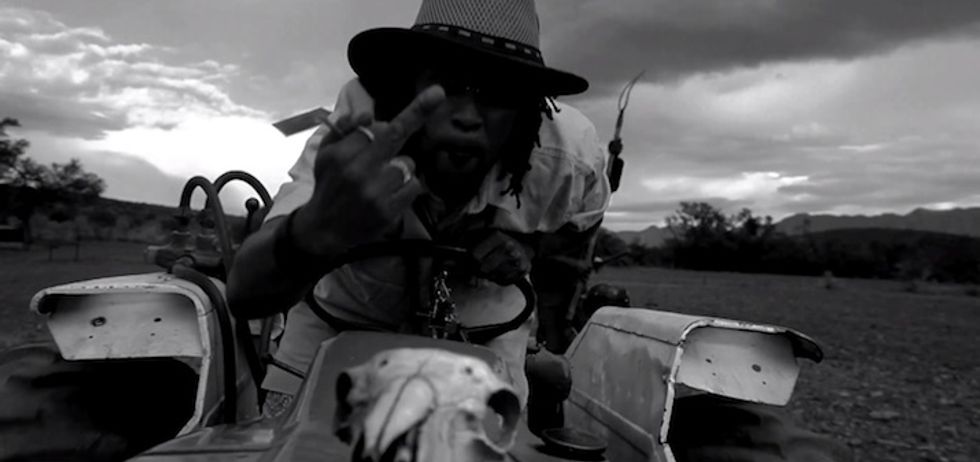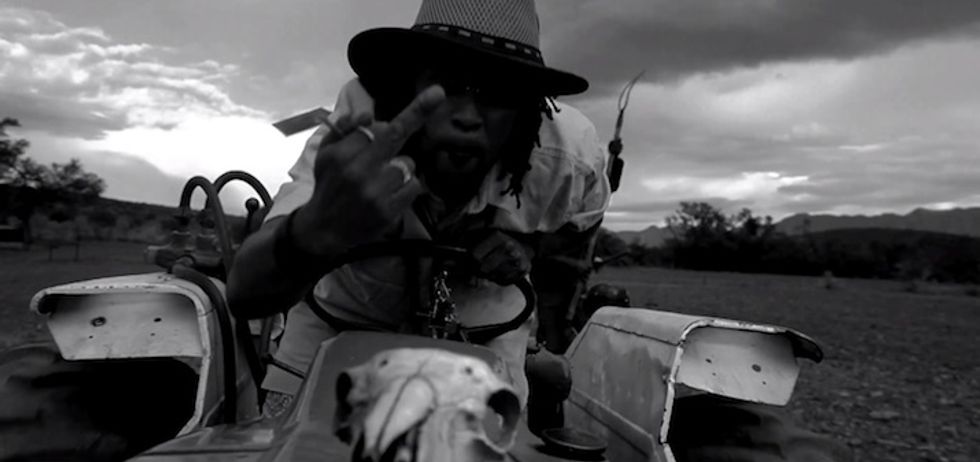DOOKOOM & The Storm Behind The Rainbow: How Far Has South Africa Progressed As A Democracy? –By Justin Buys
Justin Buys discusses DOOKOOM and the "Larney Jou Poes" storm as an indication of how far South Africa has progressed as a democracy.

Written by Justin Buys
Cape Town’s notoriously subversive gothic hip-hop outfit DOOKOOM recently ignited a wildfire of controversy with the visually potent music video for their racially charged, thunderously dark post-Apartheid protest song "Larney Jou Poes." The Dane Dodd-directed video, which depicts the group's lead vocalist Isaac Mutant (an activist rapper from Mitchell’s Plain who’s collaborated with Die Antwoord and performed with Public Enemy) on a tractor galvanising a troop of disgruntled coloured farm workers, went viral when the right wing Afrikaans fundamentalist group AfriForum decided to lay a lawsuit against the act for inciting violence against farmers. The backlash from the conservative Afrikaans community since the release of the video included racially antagonising remarks by prominent Afrikaner folk musician and Apartheid apologist Steve Hofmeyr.
The tenor of the outcry reminds me of the viral video “Les Poids des Apparences” ("The importance of appearances") from French social experimentalist NorniTube. The video contrasts public reactions to the same man collapsing, first disguised as a homeless man (in which the public ignored him), then as a businessman (in which the public immediately rushed to his aid). To NorniTube, it was easier for the public to empathize with the suffering of a man who wasn't used to suffering. According to this logic, it's easier for the adamant objectors of DOOKOOM's video to feel sympathy for the occasionally victimized white farmers, as opposed to the habitually victimized black and coloured farm workers. The warped reasoning behind their logic: 'yes they’re suffering, but have they ever known anything outside of suffering?'
In Isaac Mutant’s fuming lyrics he didactically describes the current plight of the coloured farm worker in the Western Cape. He points out the irony of how the very racists who now accuse his people of being criminals and thieves came aboard a ship as fugitives and thieves themselves in order to steal the land from its indigenous inhabitants. He expresses a deep rooted frustration with the oppression endured by his forefathers (the Khoi and San indigenous people whom make up a significant of coloured ancestry) to the present day farm enslavement of their descendants.
In the Western Cape, where the average wage of a farm worker (like those portrayed in the DOOKOOM video) is R300 ($27) per week, workers are financially disempowered. And because they get paid in sporadic increments of cash, most of them don’t have bank accounts — this automatically disqualifies them from ever being eligible for a loan. There is no room for personal development because all major decisions have to be co-signed by the (typically Afrikaner) farm owner who thereby has autonomous control of their lives. The "Dop-System," a heinous practice where workers are remunerated in wine instead of money, is still widely used by farm owners in the province’s world renowned wineries. The farm workers are generally not allowed to join trade unions because farm owners don’t want to be exposed for how underpaid their employees are and how poor their living conditions are. The employees get threatened with job loss and eviction if they unionise. The only way for an employee to live on that property till and beyond their retirement is to ensure their offspring continue the tradition of subservience. Because they don't have any land of their own, this leads to a cycle of farm workers remaining loyal and working for farmers regardless of how they're treated.
The Western Cape is arguably the most comfortable place to be a racist in Africa. Black and coloured lives are almost invisible there; concealed in strategically distant corners of the community so their plight won’t pollute the pristine picturesque views from the blissful balconies of tourists and the leisurely class that thrives in its dinner party lifestyle. According to AfriForum those elitists deserve the global community’s pity because although they may live in the lap of luxury, they [the farmers] also live in constant fear of vengeful attacks by the hands of the people whom they’ve exploited and continue to exploit to accrue that luxury. This is the convenience of empathy.
DOOKOOM’s power is purely mythological in a sense. Isaac Mutant has replaced Julius Malema as the Boo Radley of conservative white South Africa. He’s become the new shadowy, villainous scapegoat for all of their problems and the living manifestation of their post-colonial white anxiety. DOOKOOM's "Larney Jou Poes" video has a crucial role to play in South African society — to unveil the socio-economic storm brewing as result of a structural racial imbalance which continues to dictate the day-to-day affairs of the populace. The outcome of this impending lawsuit will be an insightful indication of how far we’ve truly progressed from our sordid past as a nation. It will be a tragic indictment on our democracy if the children of those who were banned from listening to Bob Marley and Lucky Dube are banned from listening to DOOKOOM.


